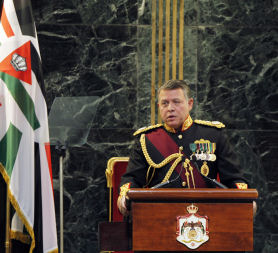King of Jordan sacks Cabinet amid demonstrations
King Abdullah of Jordan sacks his Cabinet and appoints a new Prime Minister in a bid to head off more unrest – but while this has worked before, it might not this time, an expert tells Channel 4 News.

The resignation of Jordan’s Prime Minister, Samir Rifai, was accepted by the King, who has asked a former Prime Minister with a military background to replace Mr Rifai.
King Abdullah has also dismissed the Cabinet and asked his new Prime Minister, Marouf Bakhit, to form a new Cabinet.
The King, a key US ally, is responding to protests over food prices and poor living conditions which have been taking place for weeks in Jordan, inspired by events in Egypt and Tunisia.
“It’s the same virus that afflicted Tunisia, Egypt, and is afflicting all Arab states.” Former head of Royal Court in Jordan, Adnan Abu Odeh
Protesters in Amman have been chanting anti-Government slogans and calling for Mr Rifai’s dismissal, as well as shouting support for the Egypt protestors.
The protestors blame successive Governments for a prolonged recession in Jordan and rising public debt that hit $15bn this year in one of the Arab world’s smallest economies, which is heavily dependent on foreign aid. However their anger so far has been directed towards the Prime Minister, rather than the King.
Scapegoat
Middle East expert at the University of St Andrews, Dr Frederic Volpi, told Channel 4 News that Jordan has been here before.
“The King has often used his Government and the Prime Minister as a scapegoat. A change of Government is not new in Jordanian politics,” he said.

“For many years, monarchs have been able to replace the Government to be seen to address the misgivings of the population. In the past this has been enough, but the situation in the region now is much more volatile – so what has worked before may not work again.”
Channel 4 News asks: will the protests in Egypt, Tunisia and Jordan have a domino effect in the Arab world?
He said that the situation in Egypt could have a profound impact on what happens in Jordan. If President Hosni Mubarak is ousted by the protests, this could give the Jordanian demonstrators the momentum they need.
He said King Abdullah has been given credibility in Jordan by the perception that he can mediate between different sections of the population – notably people of Palestinian origin living in Jordan, and people born in Jordan. But this could change if these groups find that their common aim of political reform is greater than their differences, he said.
“Now the question will be – will it be that easy this time around, or will the different sectors of society in Jordan come together to find common ground and decide that the Government replacement is not enough and they want more say in the political system and how their country is governed? If so, that implies reform of the monarchy,” he said.
The King has often used his Government and the Prime Minister as a scapegoat. Dr Frederic Volpi
Before his dismissal, Prime Minister Rifai had taken steps to calm citizens – announcing wage increases two weeks ago for civil servants and the military – but the measures were not enough, with demonstrators blaming Government corruption for the high food prices and difficulties facing the country’s poor.
Virus
Adnan Abu Odeh, a former head of the Royal Court in Jordan, said: “It has been a very positive step by His Majesty because in a way it’s a response to the demands of the people, who have stressed the necessity of changing the Government.
“It’s the same virus that afflicted Tunisia, Egypt, and is afflicting all Arab states. The difference between one country and another is the [level of] immunity.
“Hopefully Dr Bakhit will be able to read the scene better than before and to plan for a change, politically and economically…It’s a major step and it will help to stop the protests. Instead of calling for a change of Government, they will call on the new Government to do the reforms, such as a more representative Parliament, power-sharing and the economy.”
-
Latest news
-
‘Authentic Stupidity’: Ben Elton’s new show explores how idiotic human beings can be5m

-
Is Israel’s evacuation of Rafah the precursor to full scale invasion?3m

-
Eurovision: Non-binary artist wins for first time2m

-
Tens of thousands march in Georgian capital against ‘foreign agents’ bill2m

-
‘Russia’s number one goal is to get troops closer to Kharkiv,’ says Ukrainian security analyst4m

-




